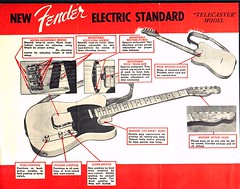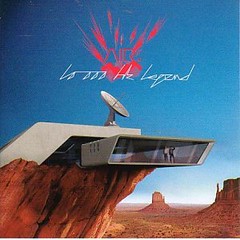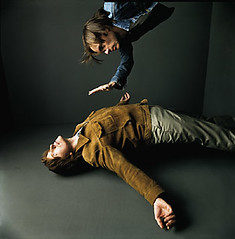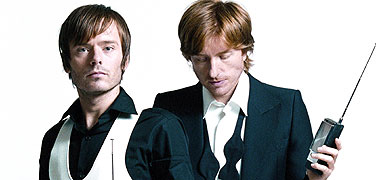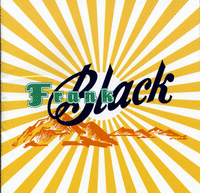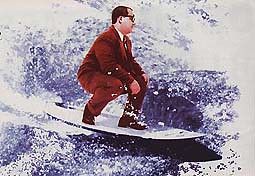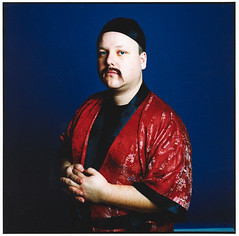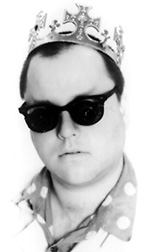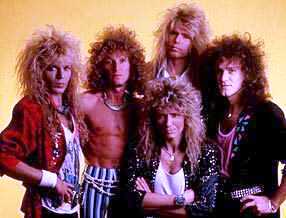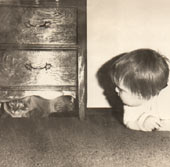You check out Guitar George he knows all the chords
Mind he's strictly rhythm he doesn't want to make it cry or sing
And an old guitar is all he can afford
When he gets up under the lights to play his thing
Dire Straits, "Sultans of Swing"
The guitar is the "prestige" instrument of rock. When seen strapped on any manner of rock performer, it stands as a symbol of credibility--nearly anybody feels like they can sing (witness the popularity of karaoke and its bastard offspring, American Idol), but if you can play guitar, you're a musician, you're cool.
In rock music, guitarists fall into two categories: lead guitarists and rhythm guitarists. Following the idea of guitar being rock's prestige instrument, guitarists who play lead enjoy higher levels of prestige. Just as the violin virtuoso receives more acclaim and flinged roses than does the second chair violin, the rhythm guitarist toils in the shadow of the lead guitarist. In the most typical of rock ensembles, one can expect to hear a solo on every one of the group's songs. One posits that the guitarist who can solo is the more skilled, more gifted guitarist; both the rhythm guitarist and the lead guitarist can play chords in sequence, after all, but if the rhythm guitarist could master scales and modes as effortlessly as the lead, then he or she wouldn't be a rhythm guitarist, would they?
Not necessarily. Rhythm guitar playing is no less virtuosic than playing lead. The very name of attached to this type of guitar playing--rhythm--disproves such reasoning: the difficulty of creating and sustaining rhythm should be easily appreciated by those who have little or none.
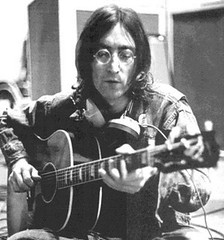 The Beatles did many things to change popular music. Though the invention of rock music is often ascribed to Bill Haley and the Comets (incorrectly or not; one could go as far back as Robert Johnson to find the starting point of rock), it goes without saying that the Beatles permanently defined the rules of rock music. After the Beatles, the prototypical rock ensemble would consist of the following makeup: lead guitarist, rhythm guitarist, bass guitarist, and drummer. Any of them could sing, and whoever sang lead was likely the guy who wrote the song. Therefore, as the Beatles are seen as the protypical rock band, John Lennon becomes the protypical rhythm guitarist, and sets many of the standards for rhythm guitar playing to this day. John Lennon never played a solo, but in some songs his rhythm took center stage, notably at the beginning of "I Feel Fine," which starts with popular music's first known instance of guitar feedback on a recording, and kicks off with John's driving rhythm, which nearly sounds like a hard-driving gospel organ. Lennon also establishes the rhythm guitarist as a vocalist. While none of the Beatles could be considered the group's "lead singer," Lennon sets the standard for the prototypical rhythm guitarist needing to, at the very least, serve as a harmonizing or backup singer.
The Beatles did many things to change popular music. Though the invention of rock music is often ascribed to Bill Haley and the Comets (incorrectly or not; one could go as far back as Robert Johnson to find the starting point of rock), it goes without saying that the Beatles permanently defined the rules of rock music. After the Beatles, the prototypical rock ensemble would consist of the following makeup: lead guitarist, rhythm guitarist, bass guitarist, and drummer. Any of them could sing, and whoever sang lead was likely the guy who wrote the song. Therefore, as the Beatles are seen as the protypical rock band, John Lennon becomes the protypical rhythm guitarist, and sets many of the standards for rhythm guitar playing to this day. John Lennon never played a solo, but in some songs his rhythm took center stage, notably at the beginning of "I Feel Fine," which starts with popular music's first known instance of guitar feedback on a recording, and kicks off with John's driving rhythm, which nearly sounds like a hard-driving gospel organ. Lennon also establishes the rhythm guitarist as a vocalist. While none of the Beatles could be considered the group's "lead singer," Lennon sets the standard for the prototypical rhythm guitarist needing to, at the very least, serve as a harmonizing or backup singer.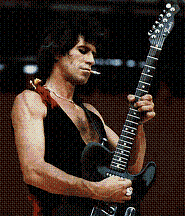 Just as the Beatles defined rock music, it could be said that the Rolling Stones refined the form. While John Lennon sets the initial standard for rhythm guitar playing, it must be said that Keith Richards set the standard by which all future rhythm guitarists would be judged. The reason for this could first be ascribed to the Stones' setting the standard for rock music itself by taking rock away from the polished sounds of white popular music and rooting it in the hard-edged rhythms of electric blues, which again points to blues legends such as Robert Johnson, Leadbelly, John Lee Hooker, and Bo Diddley as the true originators of rock music, and indeed, the unsung legends of rhythm guitar. As the inheritor of that legacy, Keith Richards should rightly be regarded as the greatest rhythm guitarist in the history of rock music. The proof is not only in his rhythmic prowess, but in the importance he forever bestowed on the cornerstone of rhythm guitar playing--the riff, or as the opening bars of "(I Can't Get No) Satisfaction" are forever known, "The Riff." What's more, as the "coolest" member of one of the coolest bands in rock history, Keith Richards established standards of personal style for rhythm guitarists that still endure--silently stalking his side of the stage, idly puffing on a cigarette, piping in harmonizing vocals whenever they're needed, taking lead vocal duty once in a great while.
Just as the Beatles defined rock music, it could be said that the Rolling Stones refined the form. While John Lennon sets the initial standard for rhythm guitar playing, it must be said that Keith Richards set the standard by which all future rhythm guitarists would be judged. The reason for this could first be ascribed to the Stones' setting the standard for rock music itself by taking rock away from the polished sounds of white popular music and rooting it in the hard-edged rhythms of electric blues, which again points to blues legends such as Robert Johnson, Leadbelly, John Lee Hooker, and Bo Diddley as the true originators of rock music, and indeed, the unsung legends of rhythm guitar. As the inheritor of that legacy, Keith Richards should rightly be regarded as the greatest rhythm guitarist in the history of rock music. The proof is not only in his rhythmic prowess, but in the importance he forever bestowed on the cornerstone of rhythm guitar playing--the riff, or as the opening bars of "(I Can't Get No) Satisfaction" are forever known, "The Riff." What's more, as the "coolest" member of one of the coolest bands in rock history, Keith Richards established standards of personal style for rhythm guitarists that still endure--silently stalking his side of the stage, idly puffing on a cigarette, piping in harmonizing vocals whenever they're needed, taking lead vocal duty once in a great while.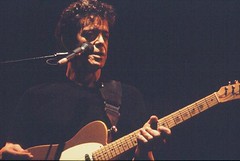 It seems downright essential that the rhythm guitarist of any band be able to contribute vocals in some fashion, be it as co-lead in a group of singers a la Lennon for the Beatles, backup vocalist and occasional lead a la Richards for the Stones, or as most often seen, lead singer of a group, such as Lou Reed, fronting the Velvet Underground or solo. With Reed, we must note the amount of seriousness he puts into his guitar playing, not letting his duty to the rhythm fall victim to his prowess as a vocalist. As with many things Lou Reed does, his insistence on contributing as a guitarist could be seen as pomposity, but in the context of rhythm guitar playing, it is essential. A lead singer can be a rhythm guitarist, but it is necessary for he or she to do more than contribute the occasional chord progression--rhythm guitar must in some way contribute to the song as a whole, and above all, must carry or contribute to the rhythm of a rock song.
It seems downright essential that the rhythm guitarist of any band be able to contribute vocals in some fashion, be it as co-lead in a group of singers a la Lennon for the Beatles, backup vocalist and occasional lead a la Richards for the Stones, or as most often seen, lead singer of a group, such as Lou Reed, fronting the Velvet Underground or solo. With Reed, we must note the amount of seriousness he puts into his guitar playing, not letting his duty to the rhythm fall victim to his prowess as a vocalist. As with many things Lou Reed does, his insistence on contributing as a guitarist could be seen as pomposity, but in the context of rhythm guitar playing, it is essential. A lead singer can be a rhythm guitarist, but it is necessary for he or she to do more than contribute the occasional chord progression--rhythm guitar must in some way contribute to the song as a whole, and above all, must carry or contribute to the rhythm of a rock song.Other noteworthy rhythm guitarists, in no particular order:
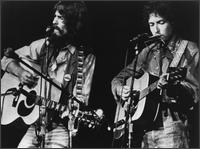
- Bob Dylan
- Black Francis, The Pixies
- Izzy Stradlin, Guns 'n Roses
- Malcolm Young, AC/DC
- Al Jardine, The Beach Boys
- David Bowie
- Ian Hunter, Mott the Hoople
- Wayne Coyne, The Flaming Lips
- Thurston Moore, Sonic Youth
- Tom Verlaine, Television
- Matthew Sweet
- Peter Buck, R.E.M.
- Robyn Hitchcock, The Soft Boys
- David Byrne, The Talking Heads
- Nash Kato, Urge Overkill
- Tobin Sprout, Guided By Voices
- Ric Ocasek, The Cars
- Chrissie Hynde, The Pretenders
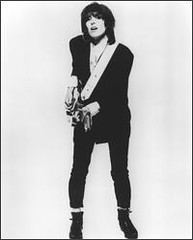
The Rock Taxonomy will continue with pt. 2: The Bass Player.
